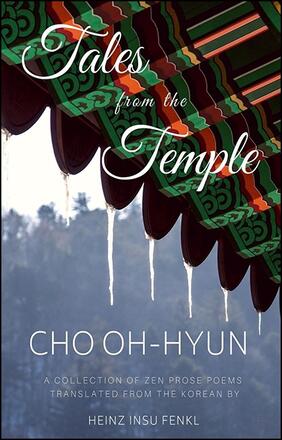
Tales from the Temple
A Collection of Zen Prose Poems Translated from the Korean
A collection of prose poems by Musan Cho Oh-hyun (1932–2018), celebrated poet-monk of the Nine Mountain school of Korean Zen.
Description
In this collection of prose poems, Musan Cho Oh-hyun, renowned abbot of Baekdamsa, one of Korea's central Zen temples, innovates on a millenia-old Buddhist literary tradition going back to Buddhist classics like the Biographies of Eminent Monks. Tales from the Temple not only presents instructive and amusing anecdotes from the lives of famous monistics from Korea, Japan, and China, it also depicts the lives and concerns of the common people—undertakers, fish mongers, fishermen, blacksmiths, and farmers—in a way that critiques social hierarchy and particularly monastic pride.
Musan Cho Oh-hyun (1932–2018) was a celebrated poet-monk of the Nine Mountain school of Korean Zen, who carried on the literary legacy of the renowned Manhae Han Yong-un (1879–1944). Heinz Insu Fenkl is an Associate Professor in the Department of English at the State University of New York at New Paltz. He is also the translator of For Nirvana: 108 Zen Sijo Poems by Cho Oh-hyun.
Reviews
Praise for Musan Cho Oh-hyun
"Reading these translations of Cho Oh-hyun's Zen sijo is like shining a light on a carefully cut, many-faceted stone. The poems are concentrated, understated, and effortlessly colloquial, both immediately accessible and, paradoxically, mysterious. The Zen nature of the poems' inquiries and observations—with their allusiveness and open-endedness—bear up under many readings, defying prized Western rationality and yielding a surprisingly rich range of tones, moods, and insights. " — Elizabeth Spires, poet and author of The Wave-Maker and Now the Green Blade Rises
"[Cho Oh-hyun] has created a new tradition of Korean sijo poetry. " — Choi Yearn-hong, The Korea Times
"While some of the poems embrace the kind of open-ended imagery commonly associated with Buddhist poetry, Cho innovates in this volume with narrative techniques that engage the senses and the imagination. " — World Literature Today
"In his Translator's Afterword, Heinz Insu Fenkl describes his astonishing encounter with the poems in this collection—from dream encounter with the poet, to the poems, then the poet himself. Extraordinary workings of the three-line sijo form into the spaces of Zen practice, the poems call us to see!" — David McCann, author of Urban Temple; editor, The Columbia Anthology of Modern Korean Poetry; professor emeritus, Harvard University